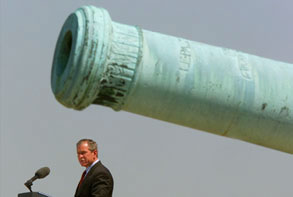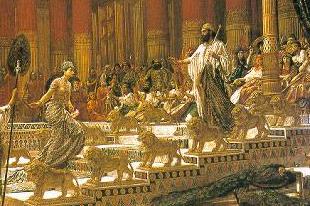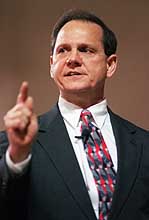(Crossposted as a comment on Chris Sciabarra’s Hussein, bin Laden, and Gramsci at Liberty & Power. I’ve made some minor edits for clarity and typesetting.)
Chris writes, concerning hostilities between Hussein’s secular Ba’athism and bin Laden’s Islamism: All of this brings to mind, once again, that the Arab-Islamic world is not a monolith.
This is, incidentally, one reason out of many to depise the phrase Islamo-fascism
–an anti-concept cooked up in the fevered brain of Christopher Hitchens, and spread like a virus throughout the war-hawks’ sphere of intellectual influence. The phrase is anti-conceptual because it has absolutely no coherent reference; it does not pick out any category by essentials, but rather gestures at motley grab bag of (admittedly nasty) ideologies that have nothing in particular in common other than the fact that they are all held by either Arabs or Muslims. Ba’athism is arguably a form of fascism (it is definitionally pan-Arabist national socialism). But it is Arab fascism, not Muslim fascism; its politics are secular, nationalist, and particularist. Islamism is certainly Islamo
, and it is certainly nasty, but it is not a form of fascism; its politics are theocratic, internationalist, and universalist. (Membership in the Ba’athist polity is conceived in terms of being born into a particular ethnic group, viz. the Arab nation; membership in the Islamist polity is conceived in terms of choosing to submit to a universalistic faith, viz. Islam, in the eyes of which all nations are equal.)
Islamism, in fact, was invented in direct opposition to the secular nationalism of pan-Arabists such as Nasser and the Iraqi and Syrian Ba’ath Party; the programme as it was originally theorized by Sayyid Qutb et al. was always mainly concerned with winning the soul of the Muslim world away from secular nationalism, whether pro-Western or anti-Western). The only things that the two have in common are:
- People who believe in them are either Arabs, or Muslims, or both.
- They endorse totalitarian politics
- They oppose the policies of the Euro-American powers
- Christopher Hitchens doesn’t like them.
But of course, neither (1) nor (2) picks out any coherent ideological kind. Arabs or Muslims
does not pick out any coherent class of people except in the racialist ignorance of an unfortunate proportion of the American public (and professional political experts
). (2) is certainly an important thing to know about any political ideology; but it doesn’t mean that there is a coherent tradition or body of ideology between two politics that share it (nobody tries to make a serious point of intellectual analysis by talking about fasco-Stalinism
or Keynsio-Islamism
). (3) is, of course, even further from categorizing by essentials; libertarians and anarchists, after all, mostly oppose the policies of the Euro-American powers; but that does not (pace Bill O’Reilly!) make for any real affiliation (whether objective
or subjective
) with Islamists or Ba’athists. (4) is the thing that most closely binds together everything that is called Islamo-fascism
—but (4) is not a cognitive category at all; it is a shared Boo! Hiss!
Of course, boos and hisses can be legitimate uses of language; they need not be anti-concepts. But Islamo-fascism
is anti-conceptual because it purports to be a serious term of analysis and criticism; in fact it cannot stand up to even the most superficial of either.
As Chris himself quite rightly points out in (among other places) Ayn Rand: The Russian Radical, Rand’s work on anti-concepts and their use in the discourse of statism is illuminated when thought of in connection with Gramsci’s notion of hegemony; the anti-concept is one of the chief weapons of the intellectual bodyguard of the Leviathan. A radical libertarianism should realize that if the Leviathan looks vast and undefeatable, it’s only because it is bloated up with a lot of rhetorical gas. As Gramsci and Rand both stressed, the study of philosophy and the practice of philosophical criticism is essential to building a free society–in part because it is necessary to deflate the anti-conceptual supports that hold Leviathan up; the political upshot of philosophy should be, as it were, to put the truth
in Speaking truth to power
.
Onward!





